Florida Passes New Gun Control Law
A big win for gun control advocates in a deeply Republican state.
Yesterday, Florida Governor Rick Scott signed a new gun law passed in the wake of the February 14th shooting at Marjory Stoneman Douglas High School in Parkland, Florida that includes several provisions disfavored by the National Rifle Association and other gun rights activists:
MIAMI — Florida’s nickname has long been the “Gunshine State” because of its plethora of firearms and loose gun restrictions. Then a troubled teenager stormed into a South Florida high school and shot 17 people dead.
On Friday, in a dramatic turnaround in one of the most gun-friendly states in America, Gov. Rick Scott signed into law an array of gun limits that included raising the minimum age to purchase a firearm to 21 and extending the waiting period to three days. It was the most aggressive action on gun control taken in the state in decades and the first time Mr. Scott, who had an A-plus rating from the National Rifle Association, had broken so significantly from the group.
The sweeping and bipartisan law is named after Marjory Stoneman Douglas High School in Parkland, Fla., where a former student, Nikolas Cruz, was charged with launching the massacre on Feb. 14. The law imposes new restrictions on firearm purchases and the possession of “bump stocks,” funds more school police officers and mental health services, broadens law enforcement’s power to seize weapons, and allows certain staff members to carry guns in schools.
Florida’s embrace of gun restrictions came as Congress remains mired in partisan divisions on the issue and as other states, from Illinois to Vermont, consider whether they ought to tighten the rules on gun ownership in the wake of the Parkland attack. Florida’s action gave hope to gun control proponents and sent the N.R.A. scrambling to contain the damage.
(…)
Standing with a group of families who had traveled to the State Capitol from Parkland, an emotional Mr. Scott called the classmates of the slain students and their parents his inspiration, and praised them for helping persuade lawmakers to pass legislation, even if neither they nor he agreed with all of its provisions.
“You made your voices heard,” he told the Stoneman Douglas High students. “You helped change your state. You made a difference. You should be proud.”
Outside of Tallahassee, the law might not look that groundbreaking: It does not go as far as laws enacted by other more Democratic-leaning states after deadly shootings. Connecticut expanded a ban on assault weapons, prohibited the sale of high-capacity ammunition magazines and imposed stricter background checks on gun purchases after 20 children and six educators were killed at Sandy Hook Elementary School in Newtown in 2012. Colorado required background checks for private gun sales and limited magazines after 12 people were killed at a movie theater in 2012.
But this is Florida, a laboratory for the N.R.A. and a state that has become recognized for its consistent efforts under legislative Republican control since 1996 to expand gun rights. For example, residents only have to comply with a simple protocol to obtain permits to carry concealed weapons. And Florida has embraced “Stand Your Ground” laws that protect the use of deadly force in public.
That such a gun-friendly state adopted any firearm restrictions represents a sea change, even more so that the restrictions were drafted and approved in a matter of three weeks, after a bipartisan vote and the signature of a Republican governor who will likely be on the ballot later this year as a Senate candidate.
“If you would have had this conversation with me before session, I would’ve said it’s just not going to happen,” said Senator René García, a moderate Republican from the Miami area who has served 16 years in the Legislature. “Not only did we get this bill passed, but the fact that we had debate on these amendments on the floor was huge. I don’t remember having these debates on the floor ever before.”
The N.R.A. has had to contend with other states also considering action since the Parkland shooting. In Illinois, lawmakers passed a bill last week that would require gun dealers to be licensed by the state, but it was not clear whether the Republican governor would sign it into law. In Vermont, lawmakers advanced legislation that would raise the minimum age to buy a gun to 21 and allow for judges to seize guns from people deemed dangerous.
The law’s passage came as a surprise to many in Florida, where lawmakers had failed to enact legislation after the mass shooting at the Pulse nightclub in Orlando in 2016, which left 49 dead, and the shooting at the Fort Lauderdale airport that killed five people in 2017. The governor mentioned both massacres on Friday.
Lawmakers like Representative Carlos Guillermo Smith, a Democrat from Orlando, voted against the bill because it did not include a ban on assault weapons or other broad measures sought by survivors of all the shootings.
“The bill doesn’t deal with the real problem at all: The problem is guns,” he said.
On the other side of the debate, lawmakers from the most conservative rural districts and Republicans seeking statewide office in contested primaries opposed the new law, saying it trampled on Second Amendment rights.
“I just can’t imagine that Nikolas Cruz can commit such a heinous crime and then, as a result, we tell potentially a 20-year-old single mother living alone that she cannot purchase a firearm to protect herself,” Representative Jay Fant of Jacksonville, a Republican running for attorney general, said on the House floor.
While the new law perhaps isn’t quite as sweeping as some gun control advocates might have liked, it is significant for a state like Florida where gun rights have long been strongly prominent at the state level and where even some Democrats representing suburban and rural districts have been known to be particularly reluctant to sign on to gun legislation. As noted, it’s also a state in which the National Rifle Association has been particularly politically active over the years, and that was apparently the case while this bill was being debated in the legislature. At the same time that the N.R.A. was lobbying legislators, though, they were also being lobbied heavily by students from Stoneman Douglas High School and their supporters, many of whom traveled up to Tallahassee just a week after the shooting to lobby the legislature to act on a bill. While those efforts didn’t yield immediate results, the fact that something like this bill was passed just three weeks after the shooting in Parkland is a strong indication of just how big an impact the events of February 14th have had on the gun debate, at least inside Florida.
The details of what’s in the bill are quite extensive, even if they don’t hit every note:
- The most prominent part of the new law, as noted above, is the provision that raises the minimum age to buy a gun from 18 to 21. As has been noted before, it was already illegal under both Florida and Federal law for anyone under 21 to buy a handgun, so this provision of the law simply adds other weapons to the list of those that can’t be sold to people under 21. Had this law been in effect last year, the shooter in the Stoneman Douglas shooting would not have been able to purchase the AR-15 he used in the shooting.
- The law also provides that gun buyers will have to wait three days, or until a background check is completed, whichever is longer. This provision closes a loophole in the current national background check system that allows a licensed dealer the discretion to decide whether or not to allow a purchaser to take possession of a gun in situations where the background check has not come back after three days. It was because of this loophole in the Federal law that the shooter in the Charleston, South Carolina church shooting was able to gain possession of the weapon he used in the shooting. Had he been forced to wait until the background check was complete it’s possible that the check would have uncovered pending felony charges from another county that would have prevented him from purchasing the weapon, although in that case, it’s worth noting that the shooter already had other weapons he could have used in the shooting incident.
- The law also bans the sale of bump stocks in Florida. As I’ve noted before, these devices allow a gun owner to effectively turn any semi-automatic weapon that uses stocks like the AR-15 into a fully automatic weapon. The shooter in the Las Vegas shooting last October had several such devices in the hotel room that he shot from into a crowd at a country music festival, an incident that killed more than sixty people and injured hundreds making it the most deadly mass shooting in American history.
- The law also allows school districts the discretion to decide whether or not to allow some non-security personnel to carry weapons and provides funding for training and other programs for districts that choose to follow this path. The bill requires that both the local school board and the local sheriff sign off on participation in the program and provides that classroom teachers would not be among those who could potentially be armed. Supporters of the provision say they anticipate that non-classroom personnel such as counselors, coaches, librarians and perhaps some administrative personnel would be the types of people who would participate in the program. The law also requires that any such persons would have to receive twelve hours of training before being allowed to carry a weapon on campus. Whether or not parents or students would be advised of the identity of any program participants is unclear from the summaries I have read. The law would also provide funding for increased security at schools that would be available to all school districts regardless of whether or not they choose to participate in the program allowing armed personnel on campus.
- Finally, the law includes provisions to allow the police to confiscate guns from anyone who is being held involuntarily for psychiatric evaluation and bans gun sales to anyone who was committed to a mental institution who determined to be mentally incompetent by a judge and would allow police to bar sales to anyone deemed dangerous for up to a year provided they get judicial approval for such action.
From the perspective of gun control advocates, the new law likely falls short of what they would deem perfect in that it does not include several provisions that they have been advocating for years. For example, it does not ban so-called “assault weapons,” or ban the sale of the AR-15 in particular, and it does not ban the sale of high-capacity magazines, which have been used by several of the most recent mass shooting incidents across the country, nor does it strengthen background checks. Despite this, these are significant moves and even more so from a state like Florida where the Republican Party controls both the legislature and the Governor’s Mansion. Politically speaking, though, it doesn’t appear that either legislators or Governor Scott will end up paying a political price for the bill. Current polling, for example, is showing that a majority of voters both nationally and in Florida are generally supportive of the provisions in the new law. Additionally, while Scott is widely expected to enter the race to challenge Democratic Senator Bill Nelson this fall, he is unlikely to face a serious Republican challenger in that race and it seems clear that breaking with the N.R.A. on these issues is something that would help him in a General Election race against Nelson that will prove to be a challenge in any case.
The fact that this bill was passed and signed into law within just three weeks after the tragedy in Parkland is a strong indication of the extent of the political momentum that the incident sparked and, to a large degree, a strong indication of the impact that the students from Parkland and their supporters were able to have in a short period of time. Whether that will continue into the future and cause other states that are as red as Florida to act in a similar fashion is, of course, a different question, as is the question of what impact all of this might have on the midterm elections in November. For now, though, those who support stricter gun control laws can count this as a victory.
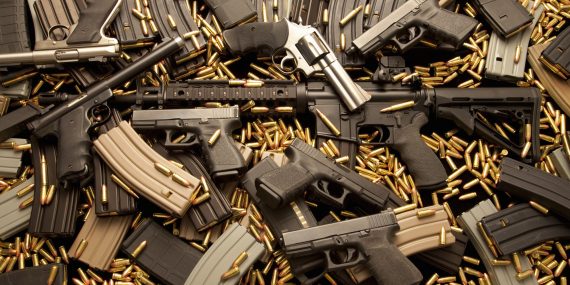

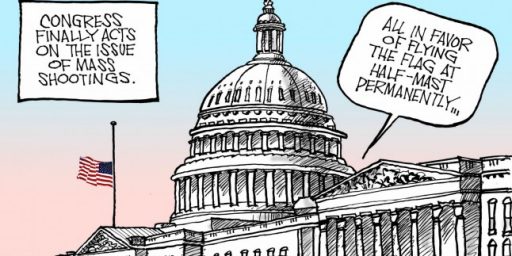
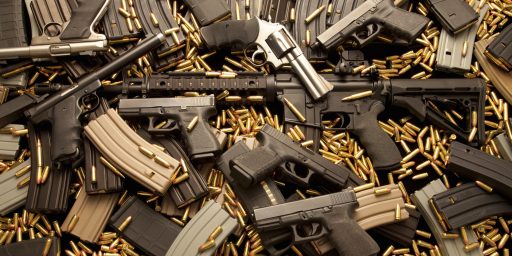

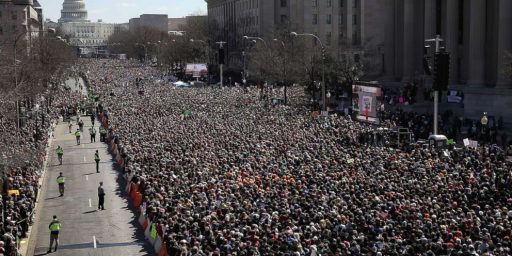
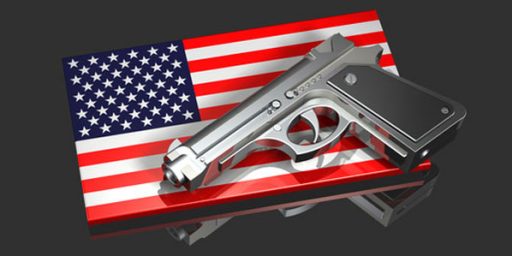
It’s true that this bill doesn’t cover a lot of things that gun control advocates want, but we are nearing a watershed moment where the entire dynamic is going to change. The fact that Florida is now putting restrictions on gun purchases means the NRA’s sea wall is failing.
After a few more mass shootings, the national consensus will likely be “why do we have weapons that allow an individual to do this much damage to this many people so quickly?” It’s like the confederate flags — they were there for decades and everyone rolled their eyes at the claims that it was about history not racism, up until people had enough.
Sadly after 6 mos in lovely Washington State I had to return to the Deep South. There are a shit-ton of confederate flags here. One guy drives his 4×4 down Hwy 41 with a 4’x6′ confederate flag mounted in his fifth-wheel.
The three day limit isn’t a loophole, it was an intentional part of the law in order to prevent states from creating de facto firearm bans by just sitting on NICS inquiries forever.
While politicians run on and pupils demonstrate, there’s a nut with ill-gotten firearms somewhere out there, planning 15 minutes of fame. A problem is the kids hear only one side of the issue, the public school side. It’s a distraction. To leftist democrats inciting kids, I’d say for God’s sake, stop protesting and protect them. Even those indoctrinated by public schools know that since 1950, only one percent of the mass shootings have occurred where citizens are allowed to defend themselves. And in Europe, every mass shooting occurred where guns are banned.
Most didn’t have to watch the Parkland news to know two things. The shooter was angry or deranged and nobody returned fire. But a difference this time was we didn’t immediately hear the usual chant, “grab the guns, grab the guns, I hate Trump.” On the other hand, a number of rational students asked about armed security. For decades, many like myself have written and called on public school policy makers to provide physical protection at least as effective as is provided for politicians and parades.
The days of hearing only from leftist democrats who repeatedly howl for another conversation, grab the guns and make new laws, paused for a moment. Some hoped the political insanity against guns had softened and they’d actually protect the kids. But student hysteria soon was roused again by big media. It was louder than ever and even moved the president to consider raising the qualifying age, prohibiting bump stocks and allowing teachers to arm themselves. Only allowing armed teachers has merit.
Machine guns disappeared from private hands shortly after the 1934 National Firearms Act. But looking at the data, just a few years later, in the ‘60s, school shootings increased dramatically. Only a few years later, during Obama’s eight years, school shooting fatalities totaled 44 percent of all the school shootings in the entire 20th century. In spite of all this data and the fact that school shootings remain extremely rare, stopping them now is worth our greatest effort.
When cooler heads prevail, we’ll realize how easy the permanent solution is. First, marshal superior force. Secondly, strike down the enemy at the gate. That’s all. It’s a simple strategy. Angry or deranged killers will be stopped or find more vulnerable victims. Senior government officials will be famous for ending school shootings. And leftists will earn their votes from inciting hysteria at other undefended places. Failure this time will prove the leftists only wish to tighten the government grip.
@Gene Ralno:
Yea, your Facebook page? Very informative.
Pack up your crazy wagon and hit the road 🙂
That this is considered a major victory for gun control tells us a lot about the current debate.